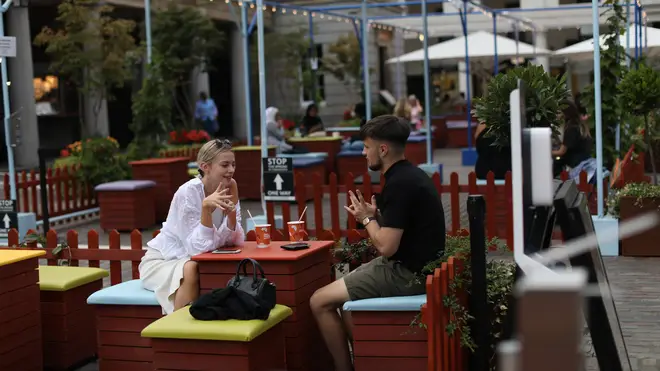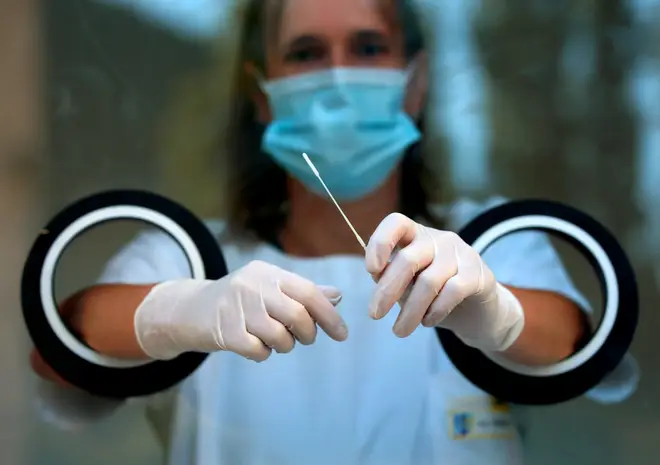
Ben Kentish 10pm - 1am
9 September 2020, 18:12 | Updated: 22 September 2020, 14:35

Boris Johnson has announced a host of new coronavirus restrictions for England to combat the sharp rise in cases, with the 'Rule of Six' set to continue. But what changes have been made?
The Prime Minister told MPs that the measures could last for six months, as he warned the UK was at a "perilous turning point" in its fight against the virus.
The change in law has been prompted by a rise in infection rates and will apply across England, the government announced.
But what are the new rules, what exemptions are in place and how will they be enforced?

Boris Johnson announced a series of changes to the rule of six:
- The penalty for breaking the rule of six will double to £200 for a first offence
- The maximum number of people able to attend wedding ceremonies and receptions will be reduced from 30 to 15 from Monday. Up to 30 can still attend a funeral
- Indoor sport will no longer be exempt from the rule of six. It means that indoor adult team sports involving more than six people - such as five-a-side football - will be banned from Thursday

Johnson: This is the moment when we must act
From Monday, gatherings of more than six people will be illegal in England unless it meets one of the listed exemption in place.
The rules apply to all age groups in England. In Scotland, those aged under 12 are exempt, while in Wales under-11s are exempt. Justice Secretary Robert Buckland told LBC there were no plans to exclude children from the rules in England.
All indoor social venues, including pubs and restaurants, are now legally required to request test and trace information from customers and keep this information for 21 days.
Previously, requesting test and trace information was only advised.
Boris Johnson also said the government is to review plans to allow audiences to return to football and other big events following a surge in coronavirus cases.
Parts of the country under local lockdown are facing further restrictions on social gatherings.

"This is a key tipping point" - Boris Johnson's new Covid restrictions
Households or support bubbles that are larger than six people are exempt from the rules.
Gatherings of more than six people for work or education purposes can continue.
The maximum number of people able to attend wedding ceremonies and receptions will be reduced from 30 to 15 from Monday. Up to 30 can still attend a funeral.
Places of worship can also continue to host up to 30 people.
Children's playgroups and youth clubs are also still allowed, as are political protests.
A full list of exemptions can be seen on the government website here.

Parents confused for kids as gatherings of more than six people to be banned
In Scotland, social gatherings are limited from today to six people from two different households, unlike England where the limit is six people full stop.
In Wales, the same rule of six as England applies indoors and outdoors - but up to four households are able to join together to form an extended household.
People in Wales will also still be able to meet up in groups of up to 30 outdoors, as long as social distancing is maintained.
Children under 12 in Scotland and under 11 in Wales will be exempt, unlike England.
The Prime Minister said that anyone who breaks the rules on social gatherings will be fined £120.
He also said that "Covid-secure marshals" will be introduced in town and city centres to enforce social distancing, although they will have no enforcement powers.
Border Force will also step up the enforcement of quarantine rules for travellers into the country.

New coronavirus restrictions will place 'intolerable pressure'
Boris Johnson said the Government is working towards a "moonshot" mass-testing of millions of people each day and that this would allow people who test negative to "go out into society more freely."
The Prime minister suggested that theatres and sports venues could test all audience members and let in those with a negative result.
He also suggested that this could happen for workplaces, with everyone testing negative in the morning allowed to enter for the work day.
Mr Johnson also urged people to only get a Covid-19 test if they are displaying symptoms.

Sumption explains why 'rule of six' is unenforceable
The government, England's chief medical officer Professor Chris Whitty and chief scientific adviser Sir Patrick Vallance have all said that urgent action is necessary after seeing the number of daily positive cases rose above 3,000 in recent days.
Professor Chris Whitty confirmed the number of Covid-19 cases have been increasing "much more rapidly" over the past few days.
He said the rates for older people and young children are flat, however those aged 20-29 are on the rise.
Hospitalisations and deaths remain low, but there is a lag to these figures.